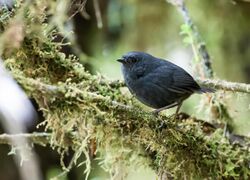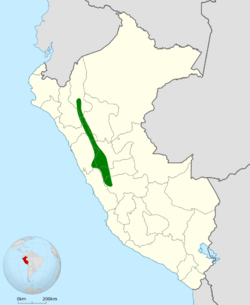Biology:Tschudi's tapaculo
| Tschudi's tapaculo | |
|---|---|

| |
| Scientific classification Error creating thumbnail: Unable to save thumbnail to destination
| |
| Domain: | Eukaryota |
| Kingdom: | Animalia |
| Phylum: | Chordata |
| Class: | Aves |
| Order: | Passeriformes |
| Family: | Rhinocryptidae |
| Genus: | Scytalopus |
| Species: | S. acutirostris
|
| Binomial name | |
| Scytalopus acutirostris (Tschudi, 1844)
| |

| |
Tschudi's tapaculo (Scytalopus acutirostris) is a species of bird in the family Rhinocryptidae. It is endemic to Peru.[2]
Taxonomy and systematics
Tschudi's tapaculo was previously considered a subspecies of Magellanic tapaculo (Scytalopus magellanicus) but was elevated to species status based on differences in their vocalizations.[3][4][5]
Description
Tschudi's tapaculo is 10.5 cm (4.1 in) long. Males weigh 17 to 20 g (0.60 to 0.71 oz) and females 16.5 to 19 g (0.58 to 0.67 oz). The adult male is dark gray above and lighter gray below; the flanks have a very light brownish wash. The female is paler overall, its rump has a brown wash, and its flanks and crissum (the area around the cloaca) are tawny with black bars. The juvenile has bars and spots.[5]
Distribution and habitat
Tschudi's tapaculo is found only the Andes of Peru, from Amazonas south to Junín in a fairly narrow elevational range of 2,675 to 3,500 m (8,776 to 11,483 ft). There it inhabits the undergrowth of humid cloud forest. Unlike several other tapaculos, it is rarely found in bamboo.[5]
Behavior
Feeding
The diet of Tschudi's tapaculo appears to be mostly insects but also includes seeds. No information is available about its foraging technique.[5]
Breeding
No information is available other than that a juvenile was collected in August.[5]
Vocalization
The song of Tschudi's tapaculo is somewhat variable but is often short notes or a series of notes such as [1] and [2].[5] The call is repeated single notes [3].[5]
Status
The IUCN has assessed Tschudi's tapaculo as being of Least Concern. Though it has a small range and its population has not been quantified, they are both believed large enough to support that rating.[1]
References
- ↑ 1.0 1.1 BirdLife International (2016). "Scytalopus acutirostris". IUCN Red List of Threatened Species 2016: e.T22729275A95011304. doi:10.2305/IUCN.UK.2016-3.RLTS.T22729275A95011304.en. https://www.iucnredlist.org/species/22729275/95011304. Retrieved 11 November 2021.
- ↑ Gill, F.; Donsker, D.; Rasmussen, P. (January 2021). "IOC World Bird List (v 11.1)". http://www.worldbirdnames.org/.
- ↑ Krabbe, N. and Schulenberg, T.S. (1997). Species limits and natural history of Scytalopus tapaculos (Rhinocryptidae), with descriptions of the Ecuadorian taxa, including three new species. Pp. 46–88 in: Remsen (1997)
- ↑ Remsen, J. V., Jr., J. I. Areta, E. Bonaccorso, S. Claramunt, A. Jaramillo, D. F. Lane, J. F. Pacheco, M. B. Robbins, F. G. Stiles, and K. J. Zimmer. Version 19 January 2021. A classification of the bird species of South America. American Ornithological Society. https://www.museum.lsu.edu/~Remsen/SACCBaseline.htm retrieved January 19, 2021
- ↑ 5.0 5.1 5.2 5.3 5.4 5.5 5.6 Krabbe, N. and T. S. Schulenberg (2020). Tschudi's Tapaculo (Scytalopus acutirostris), version 1.0. In Birds of the World (J. del Hoyo, A. Elliott, J. Sargatal, D. A. Christie, and E. de Juana, Editors). Cornell Lab of Ornithology, Ithaca, NY, USA. https://doi.org/10.2173/bow.tsctap1.01 retrieved April 30, 2021
Wikidata ☰ Q1260853 entry
 |


